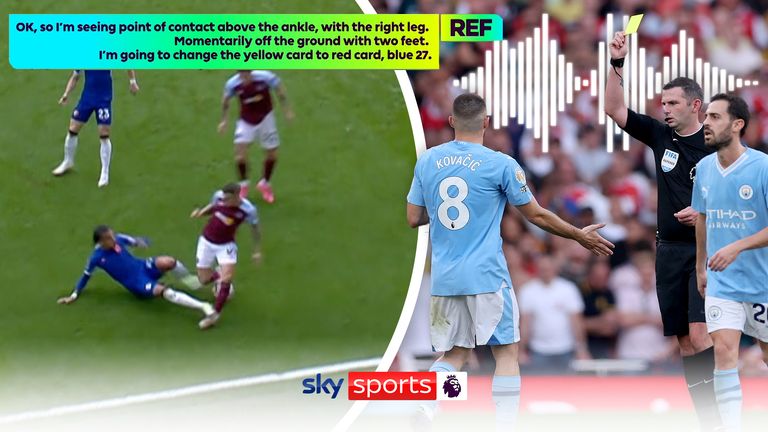Match Officials: Mic'd Up - VAR error for Luis Diaz's wrongly disallowed goal discussed by PGMOL chief Howard Webb
Howard Webb addresses the mix-up between officials that saw Luis Diaz's goal for Liverpool wrongly disallowed in their 2-1 defeat at Tottenham in the Premier League in the second episode of Match Officials: Mic'd Up alongside former Liverpool striker Michael Owen
Wednesday 11 October 2023 14:54, UK
PGMOL chief Howard Webb has explained why VAR failed to rectify the clear mistake which denied Liverpool's Luis Diaz a goal against Tottenham in the second episode of Match Officials: Mic'd Up.
According to Webb, VAR Darren England "lost sight of what the on-field decision was" after going through his processes "pretty quickly". The referees' chief insists efficiency is key but "not at the sacrifice of accuracy".
Webb also confirmed that the laws of the game, as set out by FIFA and IFAB, did not allow the officials to intervene and remedy the mistake, although England and Assistant VAR Dan Cook did ask themselves that question "when the penny dropped".
Webb said: "At that point they considered whether they could intervene to stop the game but they recognised that the laws of the game, set by FIFA and the IFAB, doesn't allow that. There's obviously a process in place that sits in the laws of the game about how we use VAR to make sure it is delivered consistently throughout every league in the world. And it doesn't allow you to go back in those circumstances. As such they decided not to intervene.
"But I understand why that question was asked and I know that IFAB are, in fact before this incident even happened, I knew that they were going to do a full review of the laws of the game relating to the use of VAR."
- Stream the Premier League and more with NOW
- Get Sky Sports | Download the Sky Sports app
- Premier League table | Watch free Premier League highlights
Additionally, Webb clarified that the on-field referee, Simon Hooper, was not informed of the mistake until the end of the game. Sky Sports News has previously reported that he was made aware at half-time.
In full: Webb's analysis of the Diaz goal mistake
Tuesday night's show marked the first occasion when Webb had publicly discussed the Luis Diaz goal controversy. Here, in full, is what the PGMOL chief had to say:
Michael Owen: "How do you view this incident?"
Howard Webb: "We took the unusual step of releasing the audio from this situation not long after it happened. We wanted to show everybody what was very quickly apparent to us as a pretty significant human error and loss of concentration.
"We are all disappointed that the VAR system didn't step in to rectify a clear error that we had seen on the field with the disallowing of the goal. Nobody is more disappointed than the officials themselves. They take pride in their work, they want to be a positive influence on the game. In this situation that wasn't the case. Of course, without VAR that disallowed goal would still have been a disallowed goal but VAR exists to step in when we make a wrong decision on the field.
"So, of course, we are disappointed and our job then was to try and find out what happened and what we could do to prevent that sort of thing from happening in the future."
Michael Owen: "How did that confusion occur?"
Howard Webb: "That is a fair question. At the very start of the clip you can hear the VAR, Darren England, say, 'Checking the offside', then he goes into the process of checking whether or not Luis Diaz was in an offside position. He is able to do that because the flag was correctly delayed by the on-field assistant referee. You can hear that Darren [England] is going through the process pretty quickly. We often get criticism for being a little bit slow sometimes, people want us to be as quick as we can be. We do focus on efficiency but never at the sacrifice of accuracy - we need to be accurate.
"You can hear Darren's trying to be quick and then he puts a line across on to Cristian Romero and that shows a very clear picture. At that point, Darren loses sight of what the on-field decision was, sees the clear picture with Diaz in an onside position and quickly 'check completes' it. The game is ready to restart very quickly, he communicates to the on-field referee Simon Hooper, 'Check complete, check complete'. Simon hears that and obviously assumes that check complete is for the offside or the disallowing of the goal and the game restarts."
Michael Owen: "Those words check complete feel a little bit vague in light of what has happened. Are you happy with those words or do you want more substantial comments on it?"
Howard Webb: "Human error happens in all walks of life and it happened here. What we have to do is put things in place so that should we have human error it doesn't have the damage or the impact that we saw on this occasion. One of the things that this has brought into sharp focus is the need to reiterate some of those communication protocols that are really valuable in VAR to prevent this kind of thing happening. We want the on-field referee to communicate to the VAR what the on-field decision is very clearly and then for the VAR to go back to the referee and acknowledge that they heard that properly.
"The VAR goes through the process then of checking the situation and giving clear direction to the VAR operator to get the right angles, speaking to the assistant VAR while they are going through that as well so that the assistant VAR can be another check and balance if you like. And then before communicating to the field, speaking to the AVAR to say what their intended direction of travel is going to be. Then at that moment not just saying, 'Check complete, check complete', because what are you check completing? Saying, 'Check complete, goal confirmed' or in this case, 'Check complete, offside confirmed', and then that's another trigger to the on-field officials that they are going in the wrong direction. We've put quite a lot of steps in place to ensure the error that we saw in that important game doesn't happen again."
Michael Owen: "The ball went out again 30 seconds later. Why can't the referee, because it is an exceptional mistake, stop the game and say, 'Let's go back 30 seconds?'"
Howard Webb: "I heard quite a few people ask that question. I understand why people would ask that question. Actually, the VAR and the AVAR asked themselves that question too when the penny dropped as to what had happened, I think 20 seconds had passed. At that point they considered whether they could intervene to stop the game but they recognised that the laws of the game, set by FIFA and the IFAB, doesn't allow that. There's obviously a process in place that sits in the laws of the game about how we use VAR to make sure it is delivered consistently throughout every league in the world. And it doesn't allow you to go back in those circumstances. As such they decided not to intervene.
"But I understand why that question was asked and I know that IFAB are, in fact before this incident even happened, I knew that they were going to do a full review of the laws of the game relating to the use of VAR. It has been in place for seven years now, when it was written there had never been a game that had utilised VAR anywhere in the world. They put a protocol in place and it has served the game really well. But now we have lived experience of situations like we saw this week. We can feed into that as well and IFAB will look into whether there is a need to tweak some of it. I am sure they will be looking into how this aspect of VAR is used as well."
Michael Owen: "Was the referee aware of all this while the game was going on?"
Howard Webb: "No. He wasn't. I know people talked about the expression on his face, giving tell-tale signs that he knew. But he didn't know at all until the end of the game. I think it's better if you don't know, you want to stay focused in the moment. You don't want this in your mind when you are trying to make decisions in the game. It's better that he didn't know and in this case, he certainly didn't and neither did any of the other on-field officials."
Webb highlights Man Utd disallowed goal for how communication has improved after Diaz controversy
Webb explains Luton's handball penalty against Wolves
Webb on why 'extremely fortunate' Kovacic should have been sent off in Arsenal vs Man City
Watch Match Officials: Mic'd Up on Sky Sports, and catch up on SkySports.com, the Sky Sports App and Sky Sports social channels.







